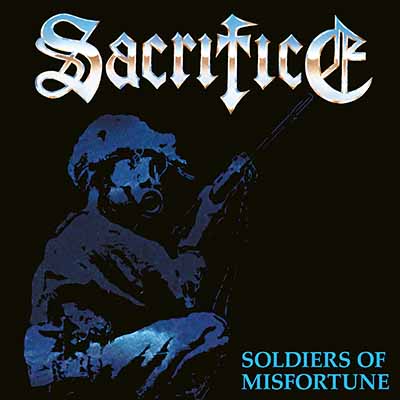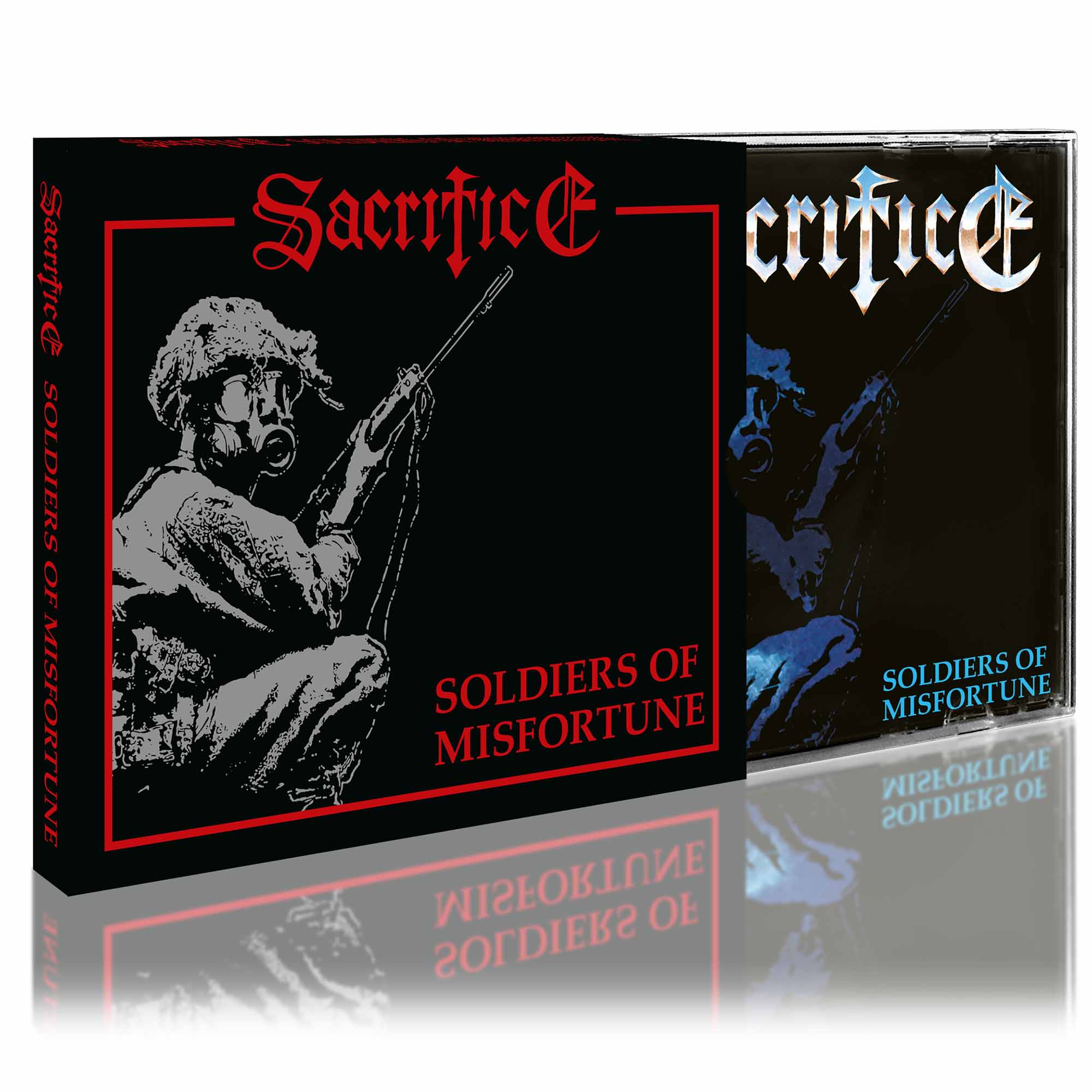 | ||||
| SACRIFICE - Soldiers of Misfortune CD | |
HRR 890CD, slipcase, poster | |
| Rob Urbinati - vocals, guitars Joe Rico - guitars Scott Watts - bass Gus Pynn - drums | |
| 01 As the World Burns 02 Soldiers of Misfortune 03 In Defiance 04 Existence Within Eternity 05 Pawn of Prophecy 06 Lost Through Time 07 A Storm in the Silence 08 Truth (After The Rain) | |
| FOR EUROPEANS ONLY! AVAILABLE | |
Following on from first generation Canadian speed metal pioneers Anvil and Exciter and heavily influenced by local Toronto thrash legends Razor, Scarborough’s own Sacrifice set out to make history a short while later in 1984.
Scarborough is situated at the east end of Toronto, roughly a 20-minute drive away from the city (or alternatively a good hour by public transport). Although there is no question that downtown Toronto was the mecca for metalheads in Ontario, Scarborough always had its own local scene.
When Sacrifice released their debut album »Torment In Fire« in 1986, reactions were really encouraging, at home in Canada as well as globally. Consequently Rob Urbinati (vocals, guitar), Joe Rico (guitar), Scott Watts (bass) and Gus Pynn (drums) wasted not time in recording their follow-up. »Forward To Termination« saw the light of day not even twelve months later in 1987 (again on Fringe Product). It was the band’s mentor Brian Taylor who thought it would be best if the band was striking the iron while it’s still hot.
Sacrifice took a little longer to record their third album »Soldiers Of Misfortune«, which was issued in Canada on Fringe Product in 1990 and on Metal Blade in the States in early 1991. “When we wrote the record, we wanted to play more musically with the same aggression as on the last record,” explains guitarist Joe Rico, “it was the most musical record we have written. There was some really good songwriting on that record.” Co-guitarist and singer Rob Urbinati adds: “We were definitely a lot tighter and better on our instruments. We were also listening to a lot of 70s stuff we grew up with, like Rush, Sabbath, Rainbow, those influences maybe came out a bit more too. The fast stuff was faster, but we also added more dynamics to the songs. Sometimes having a softer guitar part can make the next part even heavier. Our songwriting took another step. I consider »Soldiers Of Misfortune« to be our best album.” Drummer Gus Pynn, who is rarely doing interviews at all, shares the opinion of the majority of his colleagues: “The musicianship was heads and shoulders above what we had done on »Forward To Termination«. We spent a long time writing and perfecting that record. The song writing was way better as well.”
“I just remembered how professional it sounded in the studio,” reflects Joe Rico. “We rehearsed the songs so much that the recording process I thought was easier than previous studio outings.” Gus Pynn can remember the time in the studio as well: “The studio was incredible and that room: it was the same room Rush had used for recordings, and Max Webster recorded ‘Battle Scar’ there. I knew this before I spent 14 hours recording my drums. Most of those songs’ takes were finished in only one to three takes to complete. I was like a machine back then. I loved the task I had to do and I loved the results.” “I remember Brian Taylor, our producer, really pushing us,” adds singer/guitarist Rob Urbinati. “We would do a take and look at each other all smiles. Brian would hit the control room mic and say: ‘That was kind of slow.’ Gus would pick up his sticks, count us in, and we would play at our absolute physical limits. It was a demanding recording, but we were all happy with how it came out.”
Between the release of »Forward To Termination« and »Soldiers Of Misfortune« there was a gap of three years – an unusually long time for Sacrifice back in the days. “It was just the way it was,” says bassist Scott Watts today, “we recorded it in 1989, it just took a while to get released for whatever reasons back then.” “Playing shows, writing,” explains Rob Urbinati how Sacrifice passed the time between the two records. “We hit a wall a few times during writing and we just wanted the songs to be perfect. I’m sure we could have put together a few filler songs together and said ‘here is our album’, but we were never into doing that. If the four of us weren’t all fully committed to a song, we would say ‘fuck it.’”
“The title of the record is pretty self explanatory,” continues Rob Urbinati. “It’s anti-war. Young people sent off to pointless wars and return with mental scars that will always be there, even if they return alive. The people in power moving these chess pieces don’t really give a fuck.”
“Metal Blade was awesome,” is what bassist Scott Watts says about Brian Slagel’s efforts to break Sacrifice with »Soldiers Of Misfortune« in the United States.“ “Brian Slagel is legendary,” is how Rob Urbinati puts it. “Any band will tell you they wish their label did more, but Metal Blade got us exposure we wouldn’t have got otherwise.” There was one disappointment though, Roadrunner did not license the album for Europe. “We couldn’t understand it,” expresses Rob Urbinati, “I am biased, but it’s a pretty good album.”
Once again a video was shot, this time for the title track of the album, as Rob Urbinati recalls: “This video was shot in Montreal at ‘Foufounes’ by producer John Zytaruk who shot our first video for ‘Reanimation’. It received a ton of play here in Canada and a few plays on MTV too. It was cool to watch Lemmy introduce our video on MTV.” “It was really fun and a lot of work,” adds Scott Watts laughing, “good thing we were young back then.” “We had a blast doing the video for ‘Soldiers’,” adds Gus Pynn his side of the story. “My first thought when we started shooting the video was 'wow, we played that one pretty fast.' I still love to watch the video.”
A Canadian tour for »Soldiers Of Misfortune« followed the release of the album. “We've always done well in Canada, so our shows were pretty memorable,” is how Joe Rico remembers the journey. Rob Urbinati thinks so too: “It was great. Playing with Razor in Canada always seemed perfect. We had some difficult times as well, but the crowds were always amazing.” Scott Watts sums up: “Canadian tours were always fun and I think we crossed Canada with this album.”
After the tour for »Soldiers Of Misfortune«, long-time drummer Gus Pynn decided to leave Sacrifice, which came as a shock to the band, as Rob Urbinati explains: “It was difficult for all of us, obviously. Gus wasn’t writing exactly, but his input on drums guided parts of songs.” “It wasn't a great time for us at that time,” is how Scott Watts puts it.
There were rumors already in 1987 that Gus Pynn was supposed to leave Sacrifice, in order to replace Dave Lombardo in Slayer. True or false? Gus Pynn himself laughs: “Ah yes, the Slayer story. Our producer Brian Taylor asked me one night when we were down at the ‘Record Peddler’. He pulled me aside and asked if I wanted to fly out to LA and try out for Slayer. I said no and we went on to record »Forward To Termination« and »Soldiers Of Misfortune« afterward.”
However, some time after »Soldiers Of Misfortune« Gus Pynn did leave Sacrifice for real and was replaced by Mike Rosenthal of local band Dark Legion. “We always knew Mike was a great drummer,” explains Rob Urbinati, “but we felt weird about taking him from Dark Legion. We auditioned a few drummers but they either didn’t have the chops or wouldn’t fit personality wise. We were already friends with Mike and he already knew our entire set.” Scott Watts agrees wholeheartedly: “Mike was a awesome drummer, he was the only guy in Toronto who could fill Gus' shoes for us.”
MATTHIAS MADER
